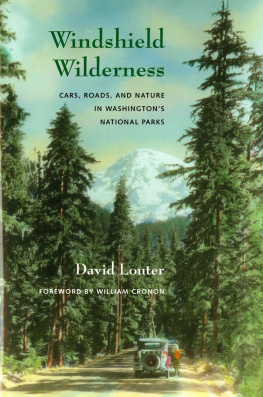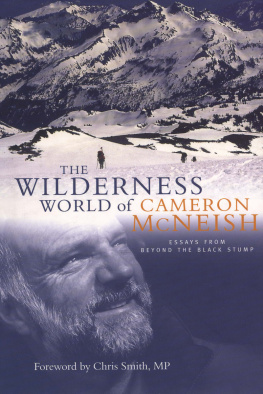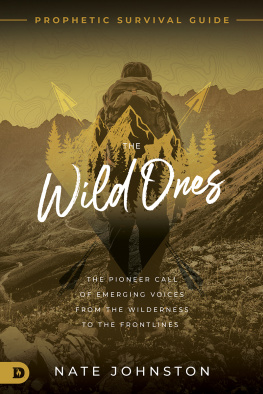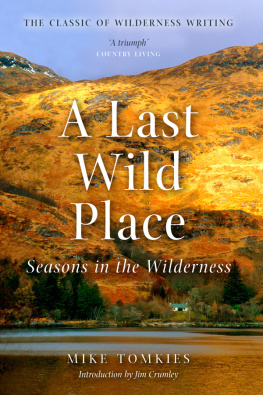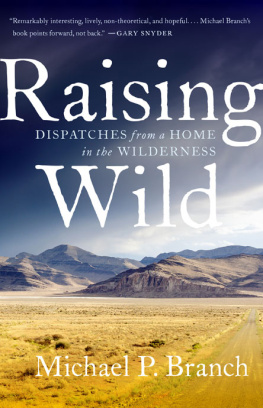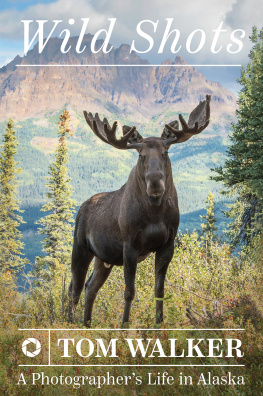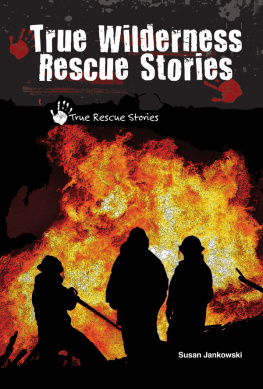Wild Visions
Wilderness as Image and Idea
Wild Visions
BEN A. MINTEER, MARK KLETT, AND STEPHEN J. PYNE
Foreword by Roderick Frazier Nash

Support for the publication of this book was provided to Ben Minteer as a Fellow of the Center for Humans and Nature.

Published with assistance from the foundation established in memory of Calvin Chapin of the Class of 1788, Yale College.
Copyright 2022 by Ben A. Minteer, Mark Klett, and Stephen J. Pyne.
All rights reserved.
This book may not be reproduced, in whole or in part, including illustrations, in any form (beyond that copying permitted by Sections 107 and 108 of the U.S. Copyright Law and except by reviewers for the public press), without written permission from the publishers.
Yale University Press books may be purchased in quantity for educational, business, or promotional use. For information, please e-mail (U.K. office).
Designed by Monograph / Matt Avery
Set in Chaparral, Blanchard, and Macklin Sans type by Monograph
Printed in China.
ISBN 978-0-300-260724 (hardcover : alk. paper)
Library of Congress Control Number: 2021952937
A catalogue record for this book is available from the British Library.
This paper meets the requirements of ANSI/NISO Z39.48-1992 (Permanence of Paper).
Contents
. Roderick Frazier Nash
. Ben A. Minteer
. Mark Klett
. Steve Pyne
. Ben A. Minteer
. Gavin Van Horn
. Steve Pyne
Foreword
RODERICK FRAZIER NASH
This important book concerns the dance between wildness and civilization over the past ten thousand years of history on earth. Nothing was wild before then because nothing was tamed or controlled. But after herding and agriculture began, it made sense to think about those parts of nature that had their own will as distinct from those that had been bent to follow the will of people. The word wild is a contraction of willed. Wilderness literally means a self-willed place. The rise of modern civilization (repeated in North America over the past four centuries) could be thought of as a pushing back of wildness. Fields were fenced, pigs and goats appeared, horses wills were broken with ropes and spurs, and wild people were conquered. Even nonliving components of the natural world such as rivers came to be thought of as wild or, if dammed, harnessed in the service of technological civilization.
But how far was too far? When did progress turn into destruction and in the process violate the rights of nature? Ben Minteer, Mark Klett, and Stephen Pyne explore in this book various shades of wildness in the American West. Their work points to the question of how we want to occupy this planet in the future. In this effort they have guidance from Thomas Cole, whose paintings made in the 1830s showed the rise and fall of an overly populated, overly controlled empire that cut off its wild roots. Cole had Rome in mind, and so did Henry David Thoreau. More recently, the sociobiologist E. O. Wilson proposed that humans allow wild nature half of the earth. My book Wilderness and the American Mind makes repeated appearances in the pages that follow; in the fifth edition, the epilogue looks out a thousand years to a low-impact, high-technology future I call Island Civilization. Human presence is imploded. The point is to leave most of the planet self-willed.
This book suggests that Aldo Leopolds mountain (described on page 11) and even Edward Abbeys solitary desert (in Bens essay that begins on page 94) have room enough for a restrained civilization. And yet we are at a crossroads, looking for a direction to turn. The ideas that follow are essential for humanity finding its way.
Roderick Frazier Nash is Professor Emeritus of History and Environmental Studies, University of California, Santa Barbara, and the author of Wilderness and the American Mind. Yale University Press published the first edition in 1967 and the fifth edition in 2014. Nash is also the author of The Rights of Nature: A History of Environmental Ethics (University of Wisconsin Press, 1989).
Wild Visions
Overlook
Layout
BEN A. MINTEER
Some years ago, I was invited to write an essay on the writer and wilderness activist Edward Abbey for a collection assessing his literary and philosophical importance. Abbey was a brilliant but often divisive figure whose book Desert Solitaire remains one of the most powerful statements in American wilderness philosophy. Id always admired his ability to drill down to the bedrock of our environmental ethics and the bluntness of his view that wilderness protection was a fundamental obligation of any society that would deem to call itself civilized. He seemed to understand better than most what was at stake.
And yet Id also grown uncomfortable with him over the years. Although I would recommend Desert Solitaire to students and friends interested in nature writing and the wilder parts of the desert Southwest, the persona Abbey created as his popularity grew in the 1970s and 1980sthat of a swaggering, rhetorical bomb thrower who took great pleasure in offending just about everyonestarted to wear me out. So, too, did the offhand misogyny in works like his satirical novel The Monkey Wrench Gang, a defect that the books memorable comic escapades and enviable sense of place just cant wash away.
But it wasnt only that. Id also found myself moving away from what originally attracted me to Abbey in the first place: his attitude toward the wilderness and the quasi-religious zeal in which he defended it. It probably boiled down to a difference in philosophical temperament and interest. My own pragmatism proved to be an increasingly bad fit with Abbeys polemics and the radical biocentrism that dripped from his pages. Like others, I also worried that such a single-minded focus on the wild stood in the way of a more inclusive environmentalism, one that made room for rural, suburban, and urban landscapes and the communities they supportedif only because the fate of the wild was, and is, bound up with the fate of these other parts of the landscape. Unlike Aldo Leopold, who wrote lyrically and forcefully about the wilderness and wildlands but never forgot that it was but one type of land use among many, Abbey seemed to have little useful to say about the challenge of living sustainably in places where the wild was not the dominant force. In fact, he had much to say that seemed to hurt the cause.
As well see later, I now think I was wrong about much of this. But getting back to that assignment, as I was struggling with what I wanted to write about Abbey, I came across a photo of him taken near the end of his life thats partly responsible for the book you now hold in your hands. It appeared in the gallery pages of an Abbey reminiscence written by his friend Jack Loeffler, a black-and-white picture of a smiling Abbey standing with two others and bearing the credit line Photo by Mark Klett.
Mark, as it turned out, was a colleague of mine at Arizona State University, and Id gotten to know him a little over the years, though I wasnt aware of his Abbey connection. Since I was flailing around trying to find a line to pursue in my essay, I sent Mark an email asking if hed be up for sitting down with me to talk about the photo and how his path ended up crossing with Abbeys. The beer is on me, I said. If you know anything about Abbey, you know that this was a fitting form of payment.
Next page

